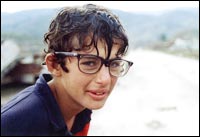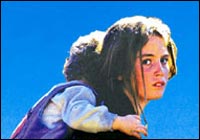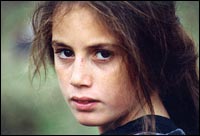The image of an armless orphan using his teeth to diffuse a landmine is not only scary and suspenseful, but also haunting. And though the movie Turtles Can Fly offers many similar images, this scene lingers on.
The image also sends a powerful message about the theme of this compelling drama that achieves intensity, despite underplayed emotions.
If you have been wondering about the miraculous power of cinema and have felt most films these days just do not have it, watch this film and your faith in movies will be restored.
 The film, with a cast of non-professionals who also happen to be refugees in a Kurdish village in Iraq, has been winning critical acclaim and awards at numerous festivals. It was one of the better appreciated films at the Toronto and Berlin Film festivals last year. It won the audience award at the Rotterdam International Film Festival as well as the Sao Paulo festival. It also won in San Sebastian, Tokyo and Chicago.
The film, with a cast of non-professionals who also happen to be refugees in a Kurdish village in Iraq, has been winning critical acclaim and awards at numerous festivals. It was one of the better appreciated films at the Toronto and Berlin Film festivals last year. It won the audience award at the Rotterdam International Film Festival as well as the Sao Paulo festival. It also won in San Sebastian, Tokyo and Chicago.
Playing in art-house theatres in New York and Los Angeles before expanding to more cities, this movie deserves to be widely seen. In portraying the lives of a handful of the most vulnerable victims of war, 37-year-old Bahman Ghobadi has created a splendid anti-war statement in his third film. It's also a fine film about survival. In fact, the actors, who play fictitious characters on screen, have shown plenty of resilience in their own young lives.
![]()
More on rediff.com !
![]()
![]()
![]()
![]()
'Why didn't you invite me earlier?'![]()
Sins: 'Very tragic, sensitive story'![]()
Box-office drought continues!![]()
![]()
![]()
Hiresh Rahman, who plays the armless boy in the film, saw a bird caught in electrical cables not too long ago, according to writer and filmmaker Ghobadi. While he freed the bird, he was electrocuted and his arms were burnt beyond recovery. Yet, he had no fear of the camera, Ghobadi said.
'The reality is very, very hard and difficult,' Ghobadi was quoted as telling a festival audience. 'Many times we were shooting and had to stop to cry.'
Now serious movie buffs in America have an opportunity to cry watching the film. But many of them could come out of theatres celebrating the film's humanity and wishing Ghobadi a long life filled with more such delicately created films.
Ghobadi's Turtles Can Fly is yet another reminder that great filmmakers do not need even a small budget (say $2 million) to make startlingly impressive films. Turtles was reportedly made for about $100,000.
Ghobadi is an Iranian Kurd and his film is a tribute to several Iranian masters -- including his mentor Abbas Kiarostami -- who are making films under difficult conditions, and yet getting them released worldwide, to immense recognition.
 The first film made in Iraq after the fall of Saddam Hussein whose regime was particularly harsh on the Kurds, Turtles Can Fly takes place mostly in a refugee camp bordering Iraq and Turkey on the eve of the American invasion of 2003.
The first film made in Iraq after the fall of Saddam Hussein whose regime was particularly harsh on the Kurds, Turtles Can Fly takes place mostly in a refugee camp bordering Iraq and Turkey on the eve of the American invasion of 2003.
In yet another underplayed but rich sequence in the film we see children struggle to set up a television antenna on a hilltop, to get CNN reports on the imminent American invasion.
Though all the amateur actors are splendidly engaging, Soran Ebrahim, who could be 14 and whose name in the movie is Satellite, draws the most attention. Nicknamed Satellite for his ability to install dishes that help his people receive news from non-official sources, he is endearing as well as brutal in his dealings with other children.
He is also a hustler and fixer, but like other children in the film who are taking risks, he too is a survivor.
As he commands the army of war orphans who will hunt for mines and shell casings to be sold for scrap, we also see in him a father figure, even though the children he recruits are not much younger.
 The sad and intriguing (and in a way colourful) refugee camp includes, apart from Satellite and the armless boy Henkov (Hiresh Rahman), his frail, suicidal sister Agrin (Avaz Latif). The armless orphan, the other kids whisper, can predict the immediate future, and Agrin is a sorceress. And then there is a very small kid, maybe just a year-old, who has to be kept on a leash; he is prone to wander onto the landmines.
The sad and intriguing (and in a way colourful) refugee camp includes, apart from Satellite and the armless boy Henkov (Hiresh Rahman), his frail, suicidal sister Agrin (Avaz Latif). The armless orphan, the other kids whisper, can predict the immediate future, and Agrin is a sorceress. And then there is a very small kid, maybe just a year-old, who has to be kept on a leash; he is prone to wander onto the landmines.
Ghobadi has dedicated the film 'to all the innocent children in the world -- the casualties of the policies of dictators and fascists.'
Saddam Hussein is clearly the unseen villain in the film but Ghobadi, who, like his mentor, was refused a visa by the US to attend American film festivals two years ago, doesn't miss an opportunity to question the attitude of the 'liberators.'






 © 2025
© 2025